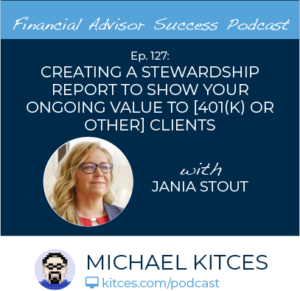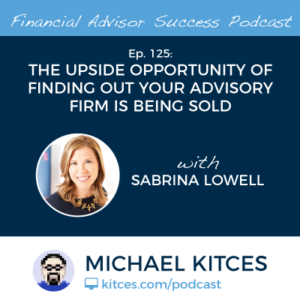 Welcome back to the 127th episode of Financial Advisor Success Podcast!
Welcome back to the 127th episode of Financial Advisor Success Podcast!
My guest on today's podcast is Jania Stout. Jania is the co-founder of Fiduciary Plan Advisors at HighTower, an advisory firm focused on 401(k) plan consulting that's responsible for nearly $4 billion of plan assets across almost 120 businesses.
What's unique about Jania, though, is the way that she's been able to rapidly grow her 401(k) practice to $4 billion entirely from scratch over the past 5 years by leveraging nearly 20 years of immersing herself into the 401(k) community to build her own personal brand and reputation as a trustworthy fiduciary.
In this episode, we talk in depth about the 401(k) plan consulting model. The way Jania's business operates as either a 3(21) or 3(38) fiduciary on a flat fee structure for 401(k) plans but tier to asset levels because plans still benchmark their fees to AUM competitors, what it takes to service and support mid-to-large-sized 401(k) plans with tens or even hundreds of millions of dollars for a fee that itself may be tens of thousands of dollars a year, the tools that Fiduciary Plan Advisors uses to support its fiduciary governance consulting with 401(k) plans, and the unique stewardship report that Jania built and automated in her CRM to show all of her clients all the behind-the-scenes work that the firm does on their behalf every year as a means to justify why her clients should stick with her and even accept an increase in their fees going forward.
We also talk about Jania's own path in growing the 401(k) business. From getting involved with SHRM, the Society for Human Resource Management and doing CE education classes for members of their association to being active on LinkedIn and leveraging LinkedIn Groups as a way to network with other professionals, leveraging the industry's various best firms list to generate more inbound requests for proposal inquiries for 401(k) plan opportunities, and why Jania was ultimately willing to break away from her prior firm despite a non-compete and needing to start over entirely from scratch in her mid-40s in order to build her business independently the way she wanted.
And be certain to listen to the end, where Jania talks about the challenges in going independent, where you no longer have a national brand's name and logo on your business card, and what she did to establish her own credibility, even when the firm was little more than her and just a team member or two.
So whether you're interested in learning how Jania built her 401(k) advisory business, how she and her team demonstrate their ongoing value to clients by using "Stewardship Reports", or her advice on how to enter the 401(k) space, then we hope you enjoy this episode of the Financial Advisor Success podcast.

 Welcome back to the 126th episode of Financial Advisor Success Podcast!
Welcome back to the 126th episode of Financial Advisor Success Podcast! Welcome back to the 125th episode of Financial Advisor Success Podcast!
Welcome back to the 125th episode of Financial Advisor Success Podcast!
